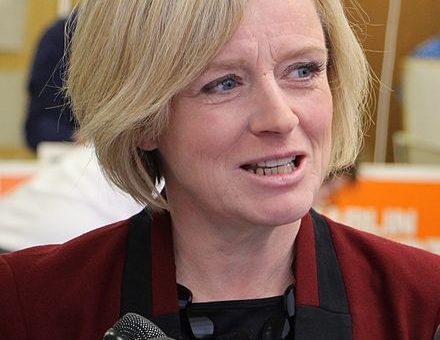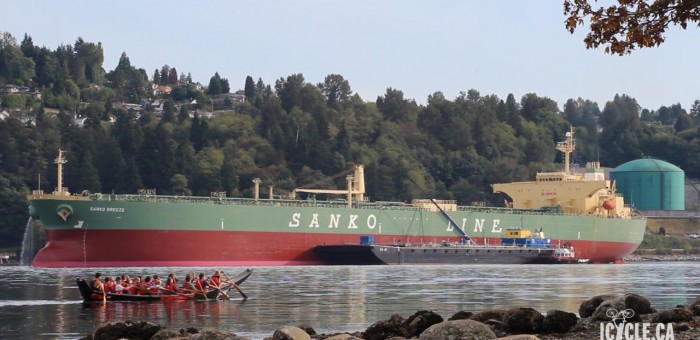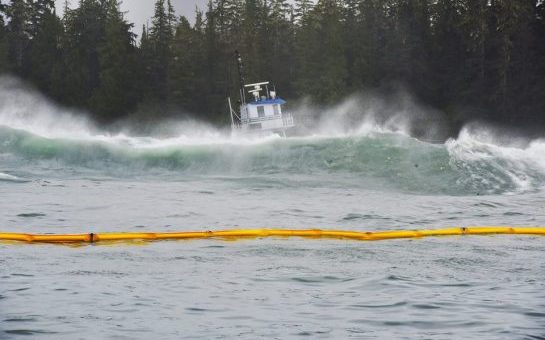Economy
Premier Notley Responds Positively to My Request for a Public Meeting
Earlier today I received an email from Rachel Notley’s staff (reproduced below). The email accepted my request for a public meeting on the Kinder Morgan pipeline. While details are scant at this stage, and I’m not sure what a meeting with “her team” means, I am very pleased that British Columbians will be given an opportunity to witness a public discussion on the issue of the Kinder Morgan pipeline.
As the only MLA who served as an intervenor on this project, I will be bringing forward the myriad concerns that I highlighted during the National Energy Board Hearings. In addition, as a climate scientist who has served as a Lead Author on the 2nd, 3rd, 4th and 5th Intergovernmental Panel on Climate Change scientific assessments, I can relate this infrastructure project to the goals that Canada agreed to when it signed the Paris Accord last year.
Text of the Letter
Dear Mr. Weaver:
On behalf of Premier Notley, thank you for your email. I appreciate you reaching out and I have shared your invitation with Premier Notley and her scheduling staff to organize a public meeting between you and her team.
Premier Notley’s scheduling staff will follow up with you shortly.
Regards,
Sonya McAdam
Premier’s Correspondence Unit
Challenging Premier Notley to a Public Debate on Trans Mountain Pipeline
Today I sent Rachel Notley an open letter inviting her to participate in a public debate to discuss the merits of the Trans Mountain pipeline and the evidence that underpins the decision to approve it. I also asked that it be televised so that every British Columbian who wants to know the facts can hear them live and unscripted.
Below I reproduce the open letter and media release.
Open Letter to Rachel Notley
December 5th, 2016
The Honourable Premier Rachel Notley
307 Legislature Building
10800 – 97 Avenue
Edmonton, Alberta T5K 2B6
premier@gov.ab.ca
Dear Premier Notley,
British Columbians believe that economic development and environmental stewardship go hand-in-hand. We are home to one of the most pristine coastlines in the world – and we value it deeply. The approval of the Trans Mountain pipeline is perceived by many as a betrayal of these values, leaving us profoundly concerned about the risks our coastlines now face.
Last week, you announced your plans to come to British Columbia to market the merits of the Kinder Morgan pipeline. You looked forward to being able to make the case to British Columbians as to why you believe that the federal approval of this pipeline is a good decision. You noted that it was important for you to inform those British Columbians who link the pipeline to increasing greenhouse gas emissions and subsequent global warming, that in fact your climate change leadership plan has very effectively delinked these issues. If those are your honest intentions, I respectfully request that you hold these conversations publicly and not behind closed doors.
In the spirit of that request, I would like to invite you to a public debate where we can discuss the merits of this pipeline and the evidence that underpins the decision to approve it. I would also ask that it be televised so that every British Columbian who wants to know the facts can hear them live and unscripted.
I sought intervention status in the Trans Mountain National Energy Board hearing both as a Member of the Legislative Assembly of British Columbia and as a scientist with a PhD in atmospheric, oceanic and climate physics/applied mathematics. As an MLA, I represent the constituency of Oak Bay-Gordon Head, which is located along the Trans Mountain tanker sailing route on the southeastern tip of Vancouver Island.
As a scientist, I served as Lansdowne Professor and Canada Research Chair in climate modeling and analysis in the School of Earth and Ocean Sciences at the University of Victoria, where I worked for almost 25 years. I have been a Lead Author on the United Nations Intergovernmental Panel on Climate Change’s 2nd, 3rd, 4th and 5th scientific assessments and have authored and co-authored over 220 peer-reviewed, scientific papers. I am a Fellow of the Royal Society of Canada, Canadian Meteorological and Oceanographic Society, the American Meteorological Society, the American Geophysical Union and the American Association for the Advancement of Science. Throughout the hearing process, I have applied my scientific expertise, particularly in physical oceanography and modelling, to evaluate the evidence provided in the National Energy Board application. I reviewed thousands of pages of Trans Mountain’s application and I asked them over 600 questions to test their assumptions.
Based on the evidence Trans Mountain presented, I can say unequivocally that we do not have the ability to clean up an oil spill. Likewise, there is no scientific credibility to the claim that we will be able to build this pipeline and meet our greenhouse gas reduction targets or honour our commitments made under the Paris Agreement.
You are asking British Columbians to take on significant economic and environmental risk without giving us a real opportunity to have ours concerns heard. Hundreds of British Columbians were already excluded from the National Energy Board hearing process. Those who could participate were denied the right to orally cross-examine Trans Mountain on their evidence. Now they are rightfully concerned that backroom political decisions are being made against their wishes and interests.
If British Columbians are going to be asked to consent to a 580% increase in oil tanker traffic, they deserve to hear a full and open debate – not just media interviews and summaries of closed-door meetings. They deserve to hear you make your case, and to have your evidence tested. Until a proper dialogue has taken place on these topics, I do not believe there is any way for us to move forward.
My contact information is listed above. I invite you to please contact my office at your earliest convenience. My team would be happy to organize a public meeting for one of your upcoming trips to British Columbia.
With best wishes,
Dr. Andrew Weaver, OBC, FRSC, FAGU, FAMS, FAAAS, FCMOS
MLA Oak Bay – Gordon Head
Leader, BC Green Party
Media Release
For immediate release
Dec. 5, 2016
Weaver challenges Notley to debate on Kinder Morgan
VICTORIA B.C. – Climate scientist and B.C. Green Party leader Andrew Weaver has written to Alberta NDP premier Rachel Notley, challenging her to a public debate on the Kinder Morgan Trans Mountain pipeline expansion. Weaver’s challenge is in response to Notley’s plan to visit British Columbia several times to “sell” the pipeline project to British Columbians.
“In the last couple weeks we have seen a number of politicians tell British Columbians why the pipeline is good for them, without actually listening to what we are saying. If Premier Notley wants to come to British Columbia to ‘sell’ us on this pipeline, then her visit needs to be about more than media interviews and backroom meetings. I am asking for a public forum that allows us to have an open and honest debate about what the evidence really says.
“I have heard both Premier Notley and Prime Minister Trudeau make claims that the evidence shows we can safely manage this pipeline. As both a scientist and the only BC MLA to serve as an intervenor in the National Energy Board hearings, I can say unequivocally that there is no evidence that supports the notion that we are prepared to respond to a heavy oil spill on our coast. It is critical that British Columbians are able to witness and take part in an honest debate about the evidence.
Weaver’s letter requests that the debate be televised so that British Columbians who want the facts “can hear them live and unscripted”.
“Part of the reason people are so concerned is that they have been shut out of this process. Hundreds of people were denied the ability to participate in the National Energy Board hearings. Those who could participate were denied the right to orally cross-examine Trans Mountain on their evidence. And now it looks an awful lot like political calculation and backroom horse-trading are ramming this pipeline through, despite serious concerns that have been raised by of British Columbians.
“You cannot address those concerns through closed-door meetings and media interviews. Only an open, unscripted debate will give British Columbians the opportunity to hear their concerns truly represented and responded to.”
A specific date will be set for the debate pending a response from Premier Notley.
-30-
Background:
Andrew Weaver received intervenor status in the National Energy Board hearing on the Trans Mountain Expansion Project both as a Member of the Legislative Assembly of British Columbia and as a scientist with a doctorate in applied mathematics and with specialty in physical oceanography and atmospheric and climate science. As an MLA, he represents the constituency of Oak Bay-Gordon Head, which is located along the Trans Mountain Tanker Sailing Route on the southeastern tip of Vancouver Island. He was the only B.C. MLA with intervenor status in the hearing process.
As a scientist, Weaver served as Lansdowne Professor and Canada Research Chair in climate modeling and analysis in the School of Earth and Ocean Sciences at the University of Victoria, where he worked for over 20 years. He was a lead author on the United Nations Intergovernmental Panel on Climate Change’s 2nd, 3rd, 4th and 5th scientific assessments and has authored and coauthored over 200 peer-reviewed, scientific papers. Weaver is a Fellow of the Royal Society of Canada, Canadian Meteorological and Oceanographic Society, the American Meteorological Society, the American Geophysical Union and the American Association for the Advancement of Science. Throughout the Kinder Morgan Trans Mountain NEB hearings, he applied his scientific expertise, particularly in physical oceanography and modelling.
Media contact
Mat Wright, Press Secretary, Office of Andrew Weaver, MLA
+1 250-216-3382 | mat.wright@bcgreens.ca
Basic Income Part III: The Future of Work
1. Introduction
This post is the third in our series exploring the concept of a basic income and its implications in BC. Our backgrounder provided an overview of the concept, the issues we are facing today in BC, and the potential implications of a basic income policy. Our second post investigated in more detail the current state of poverty, welfare rates and social assistance in BC. We are grateful for the high level of engagement that our series continues to receive on social media and this website, including the large number of thoughtful comments. Below we continue to engage with the common themes in the responses we’ve received. This dialogue is very important in exploring ideas and creating good policies.
Many of you have noted the current scarcity of jobs and the precarious nature of much work today. A second theme has been disagreement about the role of basic income in either disincentivizing people to join the workforce, or providing people the freedom and self-sufficiency required to achieve personal and professional goals. Finally, many of you spoke with optimism about the potential of basic income to exert a beneficial and potentially transformational effect on society as a whole. In responding to your comments and sketching what we believe are some of the key issues, here we explore the social impacts of precarious employment, the trend towards increasing automation of jobs, and the role that basic income could play in the changing world of work.
2. Precarious Work
The world of work is changing, most dramatically due to technological advance, especially automation, but also due to a trend away from long-term, secure, full-time work with benefits, toward short-term, part-time, and contract-based work.
Finance Minister Bill Morneau stated recently that Canadians need to get used to “job churn”, defined as making a number of career changes in one’s life through short-term contract-based employment. Since the 2008-09 recession, the majority of jobs created have been part-time or temporary. The October 2016 Canadian Labour Force Survey highlights this trend: 44,000 net jobs were created across Canada in the month of October, but this number reflects a gain of 67,000 new part-time positions and a loss of 23,000 full-time positions. Men aged 25-54 have been hit particularly hard: full-time employment for this demographic declined by 63,000 positions over the past year, while part-time employment increased by 36,000 positions. The trend is the same in BC: 55,000 new jobs have been created since October 2015, but the majority (41,000) of these have been part-time positions.
Contract-based employment, which is often short-term, with fewer hours and without benefits, is also on the rise. Many speak of the rise of the “precariat” – a workforce that moves from job to job, taking temporary positions with no benefits and little job security. While some individuals prefer the flexibility of part-time or contract-based work, for most, it is not a choice: many are forced to take the jobs available, and suffer from insecurity and low incomes due to lower wages and fewer hours.
Some sectors are hit much harder than others by these trends: the natural resource industries, manufacturing, and education sectors, for example, have seen some of the largest increases in temporary and contract-based work in recent years. There are indications this trend will continue, with the majority of new jobs being part-time, temporary, or contract-based. This would mean significant implications for the financial security and well-being of huge numbers of people across British Columbia and beyond.
3. Automation
Recent years have also seen unprecedented technological advance in speed and scale, and there has been much talk recently about the impending robot revolution – when robots could increasingly replace humans in a variety of jobs, and the rate of automation outstrips the rate of job creation. We are already seeing the impact of technology on work: automated voice recognition software is already replacing many call centre workers, car assembly plants use more robots than people, and driverless cars and trucks are already significantly impacting the taxi and trucking industries.
Looking forward, a number of forecasts suggest the potential for the rapid elimination of jobs across a range of sectors: a study at the University of Oxford, for example, found that 47% of jobs in the U.S. are at “high risk” of computerization over the next two decades. The World Economic Forum’s Future of Jobs report predicts that we are entering a fourth industrial revolution that will result in the net loss of 5 million jobs across 12 leading economies over just the next 5 years. Barack Obama’s 2016 economic report predicts that jobs paying less than $20/hour face an 83% likelihood of being automated, while jobs paying between $20 and $40/hour face a 33% chance.
Some argue that predictions about the effects of automation overstate the risk: that machine-caused unemployment has been predicted before and always been misguided; that automation lowers costs and creates new jobs; and that any transition would be gradual. Yet the rate of technological advance so far has exceeded most estimates. Furthermore, many of those speaking out most loudly about the disruptive potential of technology, and the need for a basic income policy to deal with the transition, come from within the tech industry itself, and thus have the most intimate knowledge of the technology and its future potential. Y Combinator, the Silicon Valley start-up incubator, is a major proponent of basic income as a way to smooth the disruption it expects to result from technological advance, and is currently running its own basic income pilot project in California.
We are already seeing the exacerbation of inequality as a result of technological advancement, as it further concentrates wealth in the hands of the few. Automation will further exacerbate inequality, as it disproportionately impacts low and moderate paying jobs and affects some sectors more than others: jobs in transportation, manufacturing, and office and administrative support are set to be hardest hit, and soonest. Bill Morneau recently specified that truck drivers and receptionists are most likely to see their jobs disappear in the coming years: these are the second most common occupations for men and women respectively across Canada, so it goes without saying that the social ramifications of large scale job loss in these occupations would be extremely significant.
4. The Role of Basic Income
If automation results in job loss at the rate many are predicting, the outcome could be an unprecedented level of structural unemployment. In this scenario, a basic income would make the transition more humane, as the alternative is a large percentage of people living on current social support systems like employment insurance and income assistance, which, as discussed in our last post, leaves many recipients below the poverty line. If inequality continues to rise, redistribution of the significant financial benefits of the robot revolution – especially for those adversely affected – is a moral imperative.
Basic income could also lessen the psychological strain on those affected by precarious work today, and on those whose work may be made redundant by machines in the future. Among the many comments we received, a number of you spoke to the emotional cost of dealing with uncertain work and an insecure future; in our last post we also touched on the psychological hardships of living on social assistance in BC. Some advocates of basic income even view it as a necessary means to prevent social breakdown resulting from the widespread unemployment and poverty that automation would cause. Basic income could also provide an essential way to keep the economy going by giving people the financial means to continue their participation in the market even if they are unable to find new jobs.
Basic income could also help mitigate against rising unemployment levels due to automation. To adapt to a changing world of work, people need the freedom and means to do so. Basic income could enable those affected by automation or the rise in precarious work to retrain for new professions, attend or return to university, college or trade school, or take entrepreneurial risks. Many basic income advocates view this flexibility as a promising way to spur further innovation and job creation, and create benefits for society as a whole. Basic income could also form part of a more visionary response to a changing world of work: by restoring a measure of financial security and freedom, it could help people create meaningful work (paid or unpaid) and foster social connections, as well as supporting volunteering work and community engagement.
5. Conclusion
At this juncture in our history, the dream of a stable, long-term career is disappearing for many, and the strong possibility exists that automation will fundamentally alter our economy and make many careers obsolete. We therefore have the obligation to create forward-thinking policies that enable us to cope with the magnitude of changes that may be coming our way. But we also have an opportunity to do more than just cope. We have the opportunity to harness these changes and create a more equitable and sustainable society that works better for all of us.
We want to know what you think about the future of work in British Columbia. Please share your thoughts on precarious work, the threat and opportunities of automation, what work means to you, and the role you think basic income could play in a shifting economy. Thank you in advance for your comments.
Statement on Canada’s Electric Vehicle Policy Report Card
Media Release: November 15th, 2016
Weaver Statement on Canada’s Electric Vehicle Policy Report Card
For Immediate Release
Victoria, B.C. – “The B.C. Liberals continue to struggle with embracing the technology of the 21st Century,” said Andrew Weaver, MLA for Oak Bay – Gordon Head and Leader of the B.C. Green Party, in response to the near failing C- grade that B.C. has received on Canada’s Electric Vehicle Policy Report Card. The report was released today by Simon Fraser University’s Sustainable Transportation Action Research Team.
“Jurisdictions around the world are actively embracing the future of transportation and B.C. is getting left behind. We have a wonderful opportunity to get on board as a leader in this sector. I hope that we seize this opportunity instead of resisting our passage into the modern age. The BC Liberal’s uninspired approach to embracing the future is typical of a government that has dragged their feet on ridehailing and significant investment in the tech industry, while championing a return to a fossil-fuel based 20th century economy.”
“Our economy is falling further and further behind the rest of the world. B.C. needs to introduce legislation that mirrors California’s Zero Emission Vehicle Standard Program and start to lead in transportation sectors such as this.”
A Zero Emission Vehicle (ZEV) Standard Program has also been adopted by Quebec and nine US States in addition to California (Connecticut, Maine, Maryland, Massachusetts, New Jersey, New York, Oregon, Rhode Island and Vermont).
Under the ZEV Program, automakers are required to earn a set percentage of zero emission vehicle credits, through selling electric vehicles or buying credits from other automakers who have a surplus. In Quebec, automakers must maintain ZEV credits equal to 3.4% of all sales of 2018 models, rising to 15.5% in 2025. In California, credit requirements are 4.5% in 2018 and 22% in 2025.
“With the Lower Mainland and Southern Vancouver Island geographically constrained, they represent ideal locations for the widespread adoption of zero emission electric vehicles.
“Whether we are leaders or laggards, this is where the world is heading. We ought to capitalize on that.
-30-
Media Contact
Mat Wright – Press Secretary, Andrew Weaver MLA
1 250 216 3382
mat.wright@leg.bc.ca
Background:
SFU’s Sustainable Transportation Action Research Team (START) today released the first ever comprehensive assessment of electric vehicle (EV) policy progress across the country. Canada’s Electric Vehicle Policy Report Card aims to provide provincial leaders with an assessment of whether current and planned EV policies will cut transportation-related greenhouse gas emissions at the scope, scale, and speed needed to prevent dangerous climate change. B.C. scores an underwhelming C-.
Electric Vehicle Use Internationally:
The Indian government has introduced an aggressive incentive program with the goal of having every car on its roads electric by 2030, they aim to be a 100 percent electric vehicle nation. Dutch politicians have voted through a motion calling on the country to ban sales of new petrol and diesel cars starting in 2025, to make their roads gradually electrify over the next decade. In June, Norway’s major parties reached an agreement to ban the sale of new gasoline and diesel powered cars starting in 2025. In October, German legislators of both parties voted to ban the internal combustion engine by 2030.
Responding to the National Oceans Protection Plan
Media Release: November 7th, 2016
Andrew Weaver Responds to the National Oceans Protection Plan
For Immediate Release
Victoria, B.C. – “Though weak on details, I am supportive of the initiatives outlined in the National Oceans Protection Plan includes,” says Andrew Weaver, Leader of the BC Green Party and MLA for Oak Bay-Gordon Head.
“I am especially grateful to see derelict vessels included in this plan. As an MLA for a coastal area, it is an ongoing problem I have struggled with in my riding. Currently, local, provincial and federal governments get mired in jurisdictional squabbles as the remediation process for derelict vessels is delayed, leaving boats to rust and leak on the foreshore.
“The Heiltsuk Nation has worked tirelessly to monitor and mitigate the impact of the recent diesel spill near Bella Bella. They stepped up to fill in where the provincial and federal governments were lacking and I’m glad to see the importance of co-management with Indigenous communities acknowledged in this plan.
“That said, I am worried this announcement will be held up as a justification for the approval future heavy oil projects. Even with a full protection plan the effects of a diluted bitumen spill in our waters would be catastrophic.
“If Trans Mountain were approved, which this announcement leaves room for, the number of tankers leaving Vancouver Harbour and traveling through the south coast of B.C. would increase by 580%. Currently, five tankers per month enter the port at the Westridge Marine Terminal. With Trans Mountain that would increase to an estimate 34 tankers per month. At 408 tankers transiting into and out of the Vancouver Harbour per year, over the project’s estimated 50 year lifespan that would be 40,800 tanker trips past the Gulf Islands and Southern Vancouver Island through the Juan de Fuca Strait – a route the Federal Tanker Safety Expert Panel has deemed “very high risk.”
“In both my professional and political capacity, and my role as a Trans Mountain intervener, I can state with certainty that the project must be rejected if we are to move in the right direction. The time for halfway measures – both to protect our marine environment and to reach our pledge to cap global warming well below 2.0°C – is at an end.”
“If world leaders understood what they signed in Paris, they would know that meeting the 2.0°C target is incompatible with the investment in any new fossil fuel infrastructure that is planned to be used in the next several decades.”
-30-
Media Contact
Mat Wright – Press Secretary
Andrew Weaver MLA
1 250 216 3382
mat.wright@leg.bc.ca








